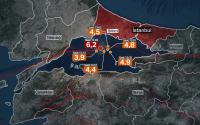6 March 2006Haaretz
"Now everything depends on your will and your decision. If you want to study for a doctorate in Haifa .... that's where you will study, under my guidance," Anna Sfard, a professor of mathematics education, told a student who had just completed his master's degree in her field, with high honors. That was less than a year ago, at the end of a professional discussion between the two. Mathematics education is a relatively new and rapidly developing field, explains Sfard, a professor in the department of education at the University of Haifa. She claims that paradoxically, just at the time when the need for scientific and mathematical tools has increased, a general decline in student achievements in these areas has begun, all over the world. The goal is to ensure that mathematics studies will equip students with suitable tools for dealing with a technologically oriented world. The student of mathematics education, Jihad al-Shwaikh, observed his interlocutor from behind elliptical glasses, and remained silent. He didn't react to her immediately, as one would expect from someone who has just been told that in addition to his high grades, he clearly has abilities, ideas and love of the field of education and teaching, which qualify him to continue his studies. Sfard seemed surprised by his silence.
Here I must reveal that Al-Shwaikh, a native of Gaza (August 1967) and a resident of Ramallah since 1990, is a good friend of mine. I was present at this meeting, half of which I had trouble understanding. But the sparks that flashed in the eyes of both of them, Jihad's rolling laughter and Sfard's smiles, showed how close they have been brought by the subject that is so important to them. I though about the nice connection that had been forged: between a native of the Al-Shati refugee camp, the son of a family originating in Ashdod, and a famous Israeli professor in the field of mathematics education - a native of Poland and the daughter of sociologist and philosopher Sigmund Bauman, who was fired from his job at the University of Warsaw, and in 1968 was forced to leave Poland with his family because of institutionalized anti-Semitism there. Sfard knew that during the past 10 years, Al-Shwaikh had worked in several Palestinian institutions for the development of teaching. But she did not yet know earlier details of his life: that as a child he lived with his mother and siblings in one room, six people, without a father. That he began to work in Israel at the age of 12, during every vacation, and especially in the summers, in the fields of Kibbutz Nahal Oz, in the packing plant in Sderot, and starting in 11th grade, in construction as well. As an outstanding student, byhigh school he had received a stipend that helped his entire family. When he went to study mathematics at Bir Zeit University in the West Bank, in 1985, he continued to work in Israel in construction, in the summers and whenever the university was closed. Sfard justly assumed that the person sitting opposite her had dedicated himself to studies and research. Therefore his sudden silence, the eyes that stared at her as though he didn't understand what she had said, surprised her. Ford Foundation grantHere I had to intervene and explain: Like other natives of Gaza who live in the West Bank, Al-Shwaikh has in effect been imprisoned in his city, Ramallah, for more than five years. On the one hand, for about 10 years Israel has been preventing Gazans from changing the address in their ID cards to one in the West Bank, even if they have lived there for years. On the other hand, for about two years Israel has considered them "illegal residents" in the West Bank. And therefore, Al-Shwaikh does not dare to leave Ramallah, for fear than a pedantic soldier at a checkpoint will discover his address and expel him to Gaza. He doesn't travel south of the Khalil Sakakini cultural center. He no longer remembers the north beyond Bir Zeit University. In such a situation, he told Sfard, when all the physical horizons narrow and close, a person's expectations of himself and his life shrink. It makes no difference how talented and ambitious he is. There is always a supreme power that detains, prevents, blocks. In the summer of 2005, a few months after the meeting with Prof. Sfard, Jihad Al-Shwaikh was accepted for doctoral studies at the University of Haifa. He also received a scholarship from the Ford Foundation. Even before that, Sfard had begun to guide him with respect to his reading material, by exchanging thoughts and ideas, and by helping him with his research proposal - on how elementary- and junior-high school students navigate their way through mathematics studies, and how their learning processes can be streamlined. The title of the dissertation: "Geometrical meta-discursive developmental changes: a communicational perspective." During the first semester of the present academic year, he took his first course with Sfard, by e-mail and telephone, on meta-cognition (thinking about thinking - one of the fields that Sfard is developing and that Al-Shwaikh has long been interested in, involving an analysis of the thinking that takes place during the learning process). At the same time, Al-Shwaikh approached the Israeli authorities and asked to receive an entry permit to Haifa, and also tried once again to change his address to Ramallah. The reply he received to both requests was negative; the Shin Bet security services were opposed to them. A "security problem," was what they wrote to attorneys Kenneth Mann and Sari Bashi of Gisha: Center for the Legal Protection of Freedom of Movement, to which Al-Shwaikh turned for help. The nature of the security problem was not explained. The High Court of Justice will be discussing Al-Shwaikh's case today, and the state has delayed its reply and asked to submit it only last night. In fact, Al-Shwaikh was arrested at the end of 1988, during the first intifada, and sentenced to 11 months in prison; he served most of the sentence in the Ketziot prison, for activity in the "popular committees." He did not confess to the activities attributed to him (incitement to strike, throwing rocks, painting slogans on walls). No reunificationDuring that period he worked in Israel every day, in construction. After he was released he returned to his studies in Bir Zeit: He received permits to travel to the West Bank, to enter Israel, for the purposes of his work in the field of teaching as well. In 1998 he was invited to a conference of mathematics teachers in the United States, and traveled via Ben-Gurion airport. In April 2002, during Operation Defensive Shield, he was arrested in Ramallah - like thousands of other young men who were detained for several days, with or without interrogation, and released. He was released after six days. Had there been any information about him, about his "dangerousness," he would have been put on trial or - like others - sent to administrative detention. So where did the "security problem" come from? Experience teaches that the ways of coping with such a problem - in the cases of Al-Shwaikh and many other thousands of Palestinians - achieve in advance what later on turns out to be policy: Concerning the issue of the change of address, it is the policy of separating the population of Gaza from that of the West Bank. In the case of Al-Shwaikh, can we conclude that the way this problem is dealt with also serves another purpose: to prevent him from living in Israel? His wife, whom he met in 1990, is an Israeli citizen. They married in 1993. Their request for "family unification" was refused "for security reasons," in the mid-1990s, long before the beginning of the process of enactment of overt legislation preventing Israeli Arab citizens from living with their partners of choice. Is that why the authorities are afraid of Al-Shwaikh's studies in Haifa? During the course of the year Al-Shwaikh progressed in his work, by e-mail, but he cannot meet with the professors and participate in classes where attendance is mandatory. Due to a lack of alternatives, while waiting for the delayed entry permit, he has also begun to think about doing his doctoral studies in a university abroad. Sfard wrote him a letter of recommendation, saying: "The fact that I was eager to work with him myself is the best evidence of my high opinion about his research skills, as well as of him as a person ... It is with regret that I need to recommend Mr. Al-Shwaikh to you, rather than collaborating with him myself." Will the High Court enable Sfard, a Jewish woman born in Poland, who works in Haifa and lives in Jerusalem, to teach Jihad al-Shwaikh, a Palestinian from Gaza, an "illegal resident" in his home in Ramallah?






